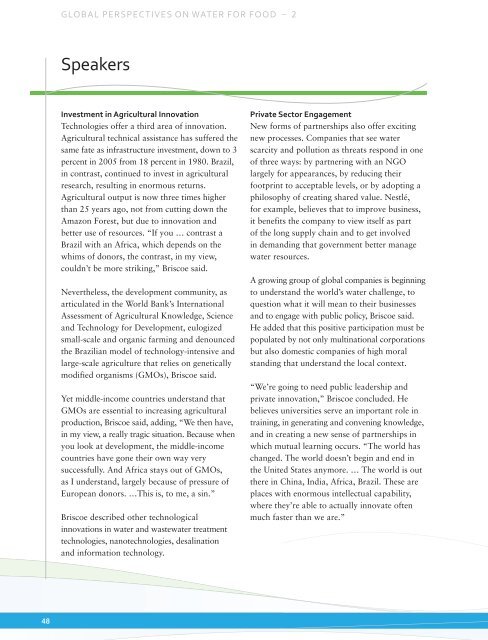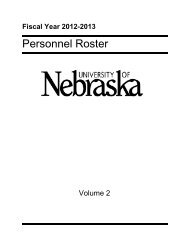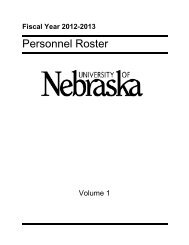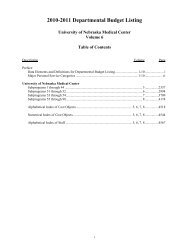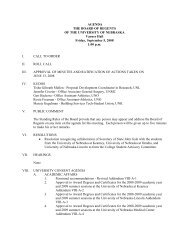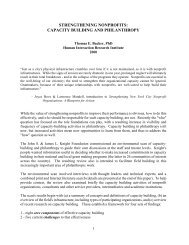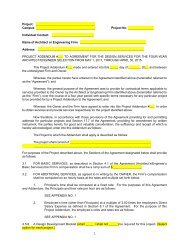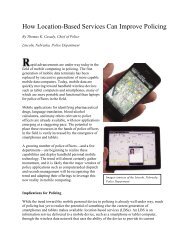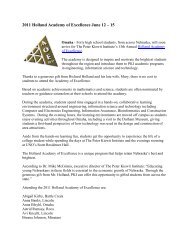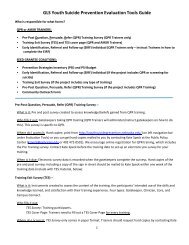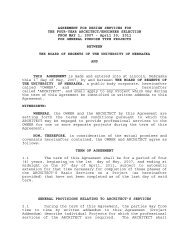Full Version - Water for Food Institute - University of Nebraska
Full Version - Water for Food Institute - University of Nebraska
Full Version - Water for Food Institute - University of Nebraska
Create successful ePaper yourself
Turn your PDF publications into a flip-book with our unique Google optimized e-Paper software.
48<br />
GLOBAL PERSPECTIVES ON WATER FOR FOOD 2<br />
Speakers<br />
Investment in Agricultural Innovation<br />
Technologies <strong>of</strong>fer a third area <strong>of</strong> innovation.<br />
Agricultural technical assistance has suffered the<br />
same fate as infrastructure investment, down to 3<br />
percent in 2005 from 18 percent in 1980. Brazil,<br />
in contrast, continued to invest in agricultural<br />
research, resulting in enormous returns.<br />
Agricultural output is now three times higher<br />
than 25 years ago, not from cutting down the<br />
Amazon Forest, but due to innovation and<br />
better use <strong>of</strong> resources. “If you … contrast a<br />
Brazil with an Africa, which depends on the<br />
whims <strong>of</strong> donors, the contrast, in my view,<br />
couldn’t be more striking,” Briscoe said.<br />
Nevertheless, the development community, as<br />
articulated in the World Bank’s International<br />
Assessment <strong>of</strong> Agricultural Knowledge, Science<br />
and Technology <strong>for</strong> Development, eulogized<br />
small-scale and organic farming and denounced<br />
the Brazilian model <strong>of</strong> technology-intensive and<br />
large-scale agriculture that relies on genetically<br />
modified organisms (GMOs), Briscoe said.<br />
Yet middle-income countries understand that<br />
GMOs are essential to increasing agricultural<br />
production, Briscoe said, adding, “We then have,<br />
in my view, a really tragic situation. Because when<br />
you look at development, the middle-income<br />
countries have gone their own way very<br />
successfully. And Africa stays out <strong>of</strong> GMOs,<br />
as I understand, largely because <strong>of</strong> pressure <strong>of</strong><br />
European donors. …This is, to me, a sin.”<br />
Briscoe described other technological<br />
innovations in water and wastewater treatment<br />
technologies, nanotechnologies, desalination<br />
and in<strong>for</strong>mation technology.<br />
Private Sector Engagement<br />
New <strong>for</strong>ms <strong>of</strong> partnerships also <strong>of</strong>fer exciting<br />
new processes. Companies that see water<br />
scarcity and pollution as threats respond in one<br />
<strong>of</strong> three ways: by partnering with an NGO<br />
largely <strong>for</strong> appearances, by reducing their<br />
footprint to acceptable levels, or by adopting a<br />
philosophy <strong>of</strong> creating shared value. Nestlé,<br />
<strong>for</strong> example, believes that to improve business,<br />
it benefits the company to view itself as part<br />
<strong>of</strong> the long supply chain and to get involved<br />
in demanding that government better manage<br />
water resources.<br />
A growing group <strong>of</strong> global companies is beginning<br />
to understand the world’s water challenge, to<br />
question what it will mean to their businesses<br />
and to engage with public policy, Briscoe said.<br />
He added that this positive participation must be<br />
populated by not only multinational corporations<br />
but also domestic companies <strong>of</strong> high moral<br />
standing that understand the local context.<br />
“We’re going to need public leadership and<br />
private innovation,” Briscoe concluded. He<br />
believes universities serve an important role in<br />
training, in generating and convening knowledge,<br />
and in creating a new sense <strong>of</strong> partnerships in<br />
which mutual learning occurs. “The world has<br />
changed. The world doesn’t begin and end in<br />
the United States anymore. … The world is out<br />
there in China, India, Africa, Brazil. These are<br />
places with enormous intellectual capability,<br />
where they’re able to actually innovate <strong>of</strong>ten<br />
much faster than we are.”


